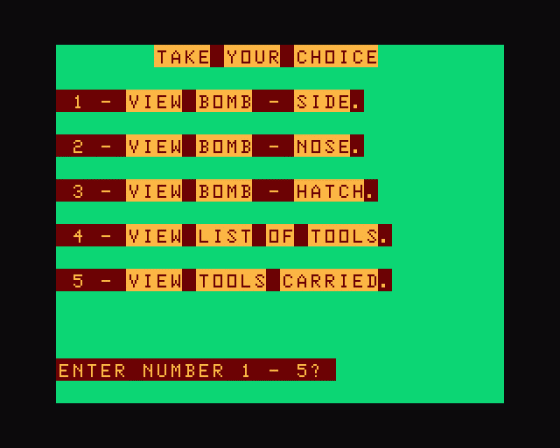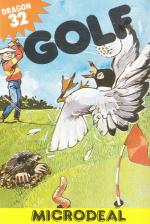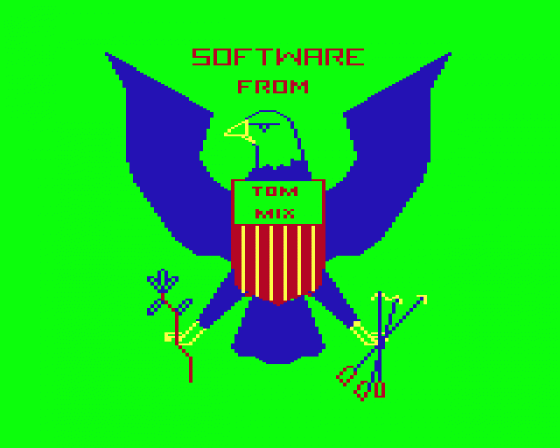
Personal Computer News
 24th November 1983
24th November 1983
Categories: Review: Software
Author: Mike Gerrard
Publisher: Microdeal
Machine: Dragon 32
Published in Personal Computer News #038
Handful of Dragons
A variety of Dragon games are on the menu as served up by Jim Ballard and Mike Gerrard
Golf
Being a fan of Microdeal software since The King, I was very disappointed with the graphics offered by Golf. Perhaps I've been spoilt or was expecting too much.
You play a round of up to eight holes with a maximum of four players. The player who finishes with the least number of strokes is the winner. You define the course beforehand as either easy, tough or unbelievably difficult.

At first the selection of clubs available for each stroke was bewildering. Being a novice, I was lost by the choices of four woods, eight irons and a chipper.
Mis-hits occur during play and you can end up in the rough, the water or a sandpit (that's a bunker). The display is limited to a bird's eye view of each hole, with the number, par, distance and player details on screen. Once the club type and number have been selected, direction is chosen using a clockface, you hit the spacebar and the ball takes off.
Dither over a shot too long and the machine prompts you with terse messages. When you finally make the green, the display changes to a circular green and all you need to specify is the distance you want the ball to travel and in which direction.

Fun for a group of would-be golfers on a wet Sunday afternoon, but there's nothing more frustrating than seeing your ball sail straight over the hole, or perch on the edge, or land again in the rough.
Needless to say I didn't manage a hole-in-one, but on one or two holes (on the hardest setting) I did get a respectable one over par.
Uxb
In Uxb, you are presented with a monster bomb and told to defuse it. While this game won't give you the sweaty palms of the real thing, it was exciting to play.

You have to select six tools from a list of twelve for your task and with the exception of one, these must be taken as you need them. A wrong decision at any time results in the bomb exploding, taking you with it.
An attractive use of graphics and text throughout. Once you've been blown up you can return to the start or go back to the last stage. Unfortunately, if you pick up the wrong tool there's no apparent way of dumping it, and carrying more than six will result in your early demise.
Help is occasionally offered - when asked - and a menu is instantly available, as is a look inside the bomb.
Having played the game through to the end and defused the bomb there's yet another obstacle to overcome, which I'll leave you to find out.
You're offered the chance of another go at the very end, but as the combinations and the scoring seem to remain the same I didn't see much point in replaying it.
Intergalactic Force
Microdeal hasn't overlooked the homicidal maniacs among its customers, and for those whose greatest delight is seeing how many millions of aliens they can zap at a sitting comes Intergalactic Force. Here you are in command of a spaceship flying along a three-dimensional corridor that comes out of the screen towards you. Above you is a fighter ship firing lasers down on you, while beneath you from time to time will pass an air-shaft down which you must drop a bomb to destroy the alien invaders in their spaceships below.
With three skill levels and a choice of fast and slow speeds, this is the type of game to present a challenge to most people, the kind which is reasonably easy to master but then grips you as you play and play and know that one mistake could be fatal.
You begin with five ships and receive a bonus one for each 1,000 points, the scoring being ten points for a fighter above you and 200 for a bomb down a shaft. You only have a limited number of bombs, and when these have run out you replenish your supply by moving your ship up off the top of the screen and back down again past the fighter.
A joystick is vital for this one, which has the requisite zap-blast sound effects with the TV on at full volume, and the machine code action ensures a smooth and fast game.
Not a game for everyone, but a good version of its kind.
Keys of the Wizard
The same might be said of Keys Of The Wizard, the first adventure game that Microdeal has released for a while. This one originated with Spectral Associates.
To really succeed you need to find all 32 treasures and take them to a place called the Sanctuary, if you can manage to find it. For all this you will be rewarded with 662 points, music, a special winning message, and, for all I know, a line of dancing chorus girls and a 21-gun salute.
There are three skill levels, the easiest being for novices and only revealing part of the game. This level is recommended so that you can get used to the various commands and the general make-up of the game, and should be completable in less than six hours.
Level two is a little more complicated, as the creatures who are out to get you are of a nastier frame of mind, and this should keep you occupied for up to ten hours. On level three, you get the works.
The commands are mostly entered in the usual verb-noun fashion.
There is nothing particularly unusual or different about Keys of the Wizard. The seasoned adventurer might prefer to look elsewhere, but for the rest of us it's a program that should provide value for money and accompany many a late-night drinking session... sorry, thinking session.
Lander
Not another Lunar Lander, I thought at first, but this version from Software Scene is a cut above some I have seen. The object is, of course, to land your lunar module as gently as possible. Landing too fast, either vertically or horizontally, too far from base, without your landing gear down or running out of fuel results in your demise. This is marked by a rather dull screen display in block graphics (and a welcome to the celestial choir).
You start by choosing your rank, between marshal and cadet, though the only difference this seemed to make was to vary your initial fuel quantity. The module's instrument console is well designed and shows you all the relevant detail - vertical and lateral speeds, altitude, distance from base, fuel, landing gear down, main or secondary engines and so on (the secondary engines have to be brought into play to negotiate the final landing phase). A neat touch is a warning panel through which various messages scroll.
If you're struck by a meteor you should don your spacesuit. Once landed, or if you decide to abort a bad attempt to land, you reach the second phase - which seems to have been tacked on as an afterthought. Here you have to take off, then dock with the mothership in orbit by matching altitude and velocities.
Lander is an unexciting affair, though just as hard as a good landing. Apart from being told that I was leaving orbit when I should have been told that I was reaching escape velocity, this fairly simple game is effective and encourages you to have just one more go to get right, but I doubt that it would have much long-term appeal.
Other Reviews Of Golf For The Dragon 32
Software Review
Software reviewer John Scriven abandons the outdoors to start exploring micro-worlds
Golf (Microdeal)
A review by J.H. (Home Computing Weekly)
Golf (Microdeal)
A review by TH (Personal Computer Games)
Golf (Microdeal)
A review















